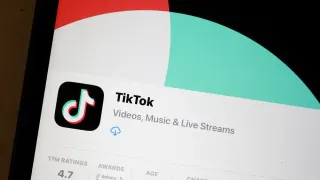
3 hours ago
Michigan Republicans Propose Sweeping Ban on Online Pornography and Transgender Content
READ TIME: 4 MIN.
Michigan Republican lawmakers have introduced sweeping legislation that would ban pornography and transgender content from the internet within state borders, marking one of the most aggressive attempts by a state government to control online speech and expression.
House Bill 4938, dubbed the "Anticorruption of Public Morals Act," was introduced on September 11 by five Republican representatives: Josh Schriver, Joseph Pavlov, Matthew Maddock, James DeSana, and Jennifer Wortz . The legislation would prohibit the distribution of "certain material on the internet that corrupts the public morals" and specifically targets content depicting transgender people alongside pornographic material .
The bill encompasses an extraordinarily broad range of content, targeting "real, animated, digitally generated, written, or auditory" depictions of sexual acts, including intercourse and masturbation . Beyond pornographic content, the legislation also seeks to ban ASMR (Autonomous Sensory Meridian Response) content and any depictions of transgender people online .
The proposed law would also restrict the use of Virtual Private Networks (VPNs), which are commonly used by individuals to protect their privacy online and access content that may be geographically restricted . This aspect of the legislation raises particular concerns for LGBTQ+ individuals who may rely on VPNs to safely access support resources and community connections, especially in areas where they face discrimination or lack local support networks.
Legal experts and civil rights advocates have raised significant concerns about the constitutionality of such sweeping restrictions on internet content. The First Amendment to the U.S. Constitution provides broad protections for freedom of speech and expression, and previous attempts by states to impose similar restrictions have faced successful court challenges.
The inclusion of transgender content in the ban represents a particularly concerning development for LGBTQ+ rights advocates. By specifically targeting depictions of transgender people, the legislation appears to single out a vulnerable minority group and could effectively erase transgender representation from online spaces accessible to Michigan residents.
The proposed legislation would have devastating effects on LGBTQ+ communities in Michigan, particularly transgender individuals who already face significant discrimination and marginalization. Online spaces often serve as crucial lifelines for LGBTQ+ people, providing access to community support, educational resources, healthcare information, and representation that may not be available in their local communities.
For transgender people specifically, online content and communities can be essential for understanding their identity, accessing transition-related healthcare information, and connecting with others who share similar experiences. The broad language of the proposed ban could potentially criminalize educational content about transgender experiences, support resources, and even basic representation in media and entertainment.
Young LGBTQ+ people, who are already at higher risk for mental health challenges and suicide, could be particularly impacted by restrictions that limit their access to affirming content and community connections. Research consistently shows that access to LGBTQ+-affirming resources and representation can be life-saving for young people questioning their identity or facing rejection from family and local communities.
The practical implementation of such a comprehensive internet content ban would face enormous technical and logistical challenges. The internet's decentralized nature and the global scope of content distribution make state-level content restrictions extremely difficult to enforce effectively.
The proposed VPN ban would be particularly problematic to implement, as VPNs serve legitimate purposes beyond accessing restricted content, including protecting personal privacy, securing business communications, and enabling remote work. Many corporations, educational institutions, and healthcare systems rely on VPNs for secure communications and data protection.
The introduction of this legislation comes amid a broader national campaign by conservative politicians to restrict LGBTQ+ rights and limit access to sexual health information. Similar efforts have been undertaken in other states, though few have attempted restrictions as comprehensive as those proposed in Michigan.
The timing of the bill's introduction, just days before the September 11 anniversary, may not be coincidental, as conservative lawmakers often use symbolic dates to draw attention to their legislative priorities. The choice to frame the legislation as an "anticorruption" measure reflects a common rhetorical strategy of positioning LGBTQ+ content and sexual health information as inherently harmful or corrupting.
While specific responses to the Michigan legislation are still developing, similar proposals in other states have faced strong opposition from technology companies, civil liberties organizations, and LGBTQ+ advocacy groups. The entertainment industry, which would be significantly impacted by such restrictions, has historically opposed content-based censorship measures.
LGBTQ+ advocacy organizations have consistently argued that such restrictions constitute discrimination and censorship that disproportionately harm vulnerable communities. They emphasize that access to diverse representation and educational content is crucial for LGBTQ+ individuals' mental health and well-being.
If Michigan were to successfully implement such restrictions, it could set a precedent for other states to pursue similar legislation. This could lead to a patchwork of internet regulations across the country, potentially fragmenting online experiences and creating significant compliance challenges for content creators and technology companies.
The legislation also raises broader questions about the role of state governments in regulating internet content and the balance between local moral standards and constitutional protections for free speech and expression.
The proposed legislation faces significant legal and practical hurdles before it could become law. It must pass through the Michigan House and Senate, survive potential legal challenges, and overcome the technical difficulties of implementation. However, the mere introduction of such comprehensive restrictions signals a concerning escalation in efforts to limit LGBTQ+ rights and online freedoms.
For LGBTQ+ communities in Michigan and beyond, the proposal serves as a stark reminder of the ongoing threats to their rights and representation. It underscores the importance of continued advocacy for digital rights, free expression, and the protection of vulnerable communities in online spaces.
The debate over this legislation will likely continue to evolve as it moves through the legislative process, with advocates on both sides mobilizing to influence its outcome. Regardless of the bill's ultimate fate, its introduction marks a significant moment in the ongoing struggle over LGBTQ+ rights and internet freedom in America.






